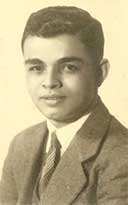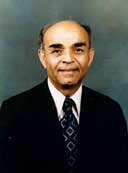Make known to me, O
Mazda, the best teachings and actions, Actuated by the Good Mind, and
inspired by Truth, As I express my aspiration in my songs of veneration
for Thee. By Thy Sovereign Authority do Thou regenerate this existence,
through Thy gracious Will, O Ahura!
(Yasna 34.15)
It is said that we are here for a reason -
although for many of us the reason is not very clear. I truly believe
Jamshed Pavri had a clear idea of why he was here on earth with us
mortals, and what he felt his mission in life was. A man with purpose,
dedication, perseverance and an anchor to all those in need.
The story of Jamshed takes me back to my
teens. I will revert to that later, after giving some background on the
man, who befriended strangers, researched endlessly and gave generously.
Background
Jamshed was born on March 20, 1917 in Bombay, India, to Khurshedji and
Bachubai Pavri from Surat. He completed his schooling at Bharda New
High School in Bombay and soon, thereafter, at the age of 17 (around
1934), he went to Hong Kong to work in his uncle’s import/export
business. Whilst he was in Hong Kong, he became actively involved in
community work, and became a member of the Ruttonjee Sanatorium. The
Ruttonjees were famous, wealthy Zarathushtis, who were involved in
charitable work to some degree.
 |
|
Jamshed Pavri
Honk Kong 1937 |
In his quiet, unassuming way, Jamshed became
well known in the community, and in 1939, he started an informal group
called Buzum-e-ruz-e Behram to study the Zoroastrian religion and
history. He became Joint Secretary, and later Secretary for the Hong
Kong Anjuman, and worked in these official capacities for almost 15
years. He was a friend of both my uncles, Faredoon and Parviz Kermani,
who were also residing in Hong Kong at that time. However, our
association with him goes further back than that.
Back to India - the place of his birth
In September 1941, Jamshed decided to go to Bombay, but was unable to
return to Hong Kong because of the Japanese take-over. During the war
years, he organized the “Far East Association” for people who had left
China, Hong Kong and Singapore, so that contacts were not lost. This
association managed to send food and medical supplies through the Red
Cross for the prisoners of war detained by the Japanese. He remained in
Bombay for 6 years, during which time he studied Avesta, Pahlavi and
Pazand languages under the scholar, Behramgore Anklesaria. He also
became actively involved with the Congress Party of India during that
time.
Coming to Canada
In 1955, Jamshed married Roda Framroze, and in 1958 they moved to
Vancouver, British Columbia, with their son, Yezdi. Jamshed set up an
import-export business at Water Street. There were not many
Zarathushtis when he came here, but he did not stop at just getting to
know and organize our community, but also helped various other faith
groups of India. He was instrumental in establishing The Zoroastrian
Society of British Columbia in February 1968. He was also the founder
member of the B.C. Interfaith Council, India Club, Immigrant Services
Society, Multicultural Society, and founder of the Gujarati Society of
B.C., of which he became the first President. In 1971 he was awarded a
Bronze Medallion for his dedicated services to the Centennial Ethnic
Group Committee. His genuine interest in helping people whenever and
however best he could prompted him to become a member of the Royal
Commonwealth Society of the Blind - becoming particularly involved in
raising funds for “Operation Eyesight”, which funded mobile eye clinics
carrying out principally cataract operations at camp sites in villages
to restore the eyesight of a countless number of people in India.
Historian and Community Builder
Jamshed Pavri was a historian and a community builder. He spent
countless hours on research and writing. The three most important
publications written by him are “A Brief History of Iran and her
Contribution to the World”, “The Zoroastrian Society of British Columbia
- 1968 to 1978, and “The History of Parsees of China between 1756 and
1989".
For two years in the 1980's, I worked
diligently on books being written by Jamshed concerning the shipping
industry of India which was controlled by the famous Wadia family, the
three-way trading traffic between China, India and Britain, and other
prominent events and Zarathushtis. I did this with the help of a
computer and program from Professor Ashok Aklujkar of UBC. The second
volume was never completed because of Jamshed’s passing away - there was
just a chapter or two to be done. I understand Mrs. Pavris sent the
manuscript to Professor John Hinnells, for publication, but I have never
seen the end product.
Roda Pavri - Jamshed’s soul mate
Much of what Jamshed accomplished can be credited to the partnership he
enjoyed with his wife, the late Roda Pavri, who passed away in January
1999 in Vancouver. Roda’s parents and she and her two sisters, Sheroo
and Diana, moved from Deolali to Poona in 1940. Roda pursued her
education there and graduated with Bachelor of Arts and Bachelor of
Commerce degrees, after which she joined her uncle, Phirozsha Framroz,
in Singapore to assist him in his business. In Singapore, Roda met a
dashing and vibrant young Jamshed Pavri, who was running a cotton
business in India with other business interests in Hong Kong and Japan.
As mentioned earlier, they married in 1955, and moved to Canada in
1958. In 1963, she returned to India with her son, Yezdi, to work on a
Bachelor of Education degree.
 |
|
Jamshid Pavri
Vancouver Canada |
Roda worked as a teacher in various schools
in the Greater Vancouver area. She helped Jamshed in his projects and
with his dreams. Roda was not only involved in giving a home to
newcomers, helping Jamshed with his community work and his writing, but
also teaching our Zarathushti kids about the religion. She taught this
in unusual ways - with music, art and drama. I remember going to their
home where so many kids would come, and I would play the piano whilst
she taught them the songs. Roda played a major role in helping us with
the congress we held here, and also during ZSBC’s 30th Anniversary
celebrations in 1998, where she was honored. The photograph of three
beautiful women show the late Gool Amrolia, my mother, Shirin, and Roda
- at our place here in Vancouver in the 1990's. Jamshed and Roda’s son,
Yezdi, is living in Vancouver.
My association and recollections
How and when did I get to know Jamshed? Jamshed was a friend of my
mother, Shirin (maiden name Kermani) and her family. Shirin is the
niece of the late Arbab Kaikhosrow Shahrokh - her father, Rustom, and
Kaikhosrow were brothers. The Kermanis were in Shanghai, and either
Jamshed met them when he went to Shanghai, or they met him when they
went to Hong Kong. I know that they were friends thereafter. The
photograph of Jamshed given to my mother was taken in 1938 in Hong
Kong. When my parents, Dali and Shirin Tata, and my younger sister,
Zarine, were in Poona uptil 1957, Jamshed visited us often, as he had
business interests in Poona. He introduced us to his wife, Roda, and we
met her briefly. He encouraged me in my studies, and always found time
to explain things in a round-about way. He would ask me to think deeply
about the question I had for him, and try and find the solution myself.
We did not see Jamshed when we moved to Bangalore, but he kept in touch,
and he wrote and told us of his move to Canada. I corresponded with him
from time to time, and knew how well respected and active he was in
Vancouver. When my sister immigrated to Vancouver in 1980, accompanied
by my mother, they stayed with the Pavris. In fact, that was the year
Jamshed and Roda celebrated their 25th Wedding Anniversary, and where my
sister, Zarine, met who was going to be her husband - the debonair Nanu
Dastur - for the first time!
When I came to Vancouver in 1981, it was
Jamshed who got me involved in Zarathushti community affairs from almost
the word “go”. He tried to make me as active as possible in the
educational field, and also with committees as our cemetery committee.
He was rigid in some of his views, but you would never guess - as he was
as persuasive too. In my opinion, he was a great man.
Our memories of a pioneering spirit
Jamshed worked very hard to find a permanent home for our community in
British Columbia and, together with others - principally Mehraban
Zartoshty, Ed Eduljee and Farrokh Namdaran - secured the present
premises we have for our Darbe Mehr in Burnaby, British Columbia, on
November 30, 1985. This was purchased through the fund donated by Arbab
Rustam Guiv through his dear wife, Morvarid Khanum, who was invited to
the official opening of the Darbe Mehr on March 26, 1986.